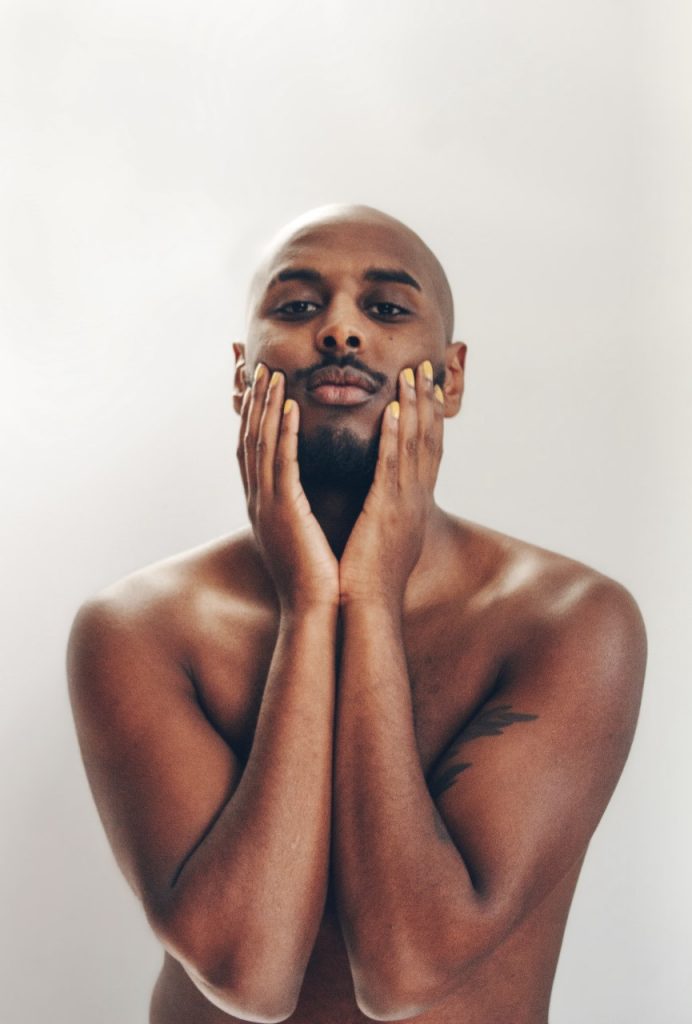Just like the glass ceiling for women, the lavender ceiling prevents many LGBTQ individuals from job attainment and security.
Feeding Her Wolf
Is the teleprompter font large enough? Check.
Is the stage equipment set up correctly? Check.
Are the lights and speakers in the perfect position? Check.
During the week, Rachel Replogle worked at her local church, The Gathering, and prepared the rest of the staff for their upcoming Sunday service.
On the outside, Rachel spent most of her time behind the scenes, making sure everything ran smoothly as the church’s tech director. She was a churchgoer before she began her job at one. She studied the Bible and strengthened her belief in God regularly.
On the inside, she was suppressing her own beliefs about herself as she tried to deny her sexuality every day at work.
Rachel says she was influenced by a lot of heteronormative ideals before she came out.
“I tried conversion therapy. I tried a bunch of stuff. I just had messed up theology. And as my theology began to change, I started to question more things. I started to accept myself more,” says Rachel.
“I had this metaphor in my head that my sin was like a wolf,” she says. “And the more that I fed the wolf, the bigger it would grow, and the more control it would have over me. When the truth of the matter is, it was exactly the opposite. The more I starved the wolf, the more I starved myself.”
Unfortunately, Rachel knew that her time at the church was limited if she fully accepted who she was and came out as a lesbian.
“It was very clear that I would not be able to continue working at that church if I fully came out. So I sort of did them a favor, and I resigned, so that they wouldn’t have to fire me,” Rachel says.
According to Rachel, resigning from her job at the church was less like losing a job, but more like moving to another country, where she had to relearn everything she thought she already knew.
“It was like learning that up was down and down was up and everything’s been inside out the whole time, and the whole world is completely not what I thought it was,” she says. “It was like learning that I’ve been seeing green, and everyone else sees purple. Suddenly I don’t know which way is up and which way is down, and I don’t know what happens after I die, and I don’t know if good and evil actually exists. And I don’t know if I’ll ever see my dead relatives again, and I don’t know if I’m lovable, and I don’t know who I am. I had to completely reinvent the world that I knew I had to re-evaluate everything I’d ever thought of. I didn’t even realize that I didn’t have much of an identity outside of my religious perspective, and so I had to completely reinvent myself.”
Her resignation also caused a significant financial struggle, to the point where Rachel still struggles with debt to this day, even after finding a replacement job at Panera Bread. But she says the change also allowed her to reform her theology and get to a better place mentally.
For decades, women have scaled the ladder to reach gender equality in male-dominated workplaces. Whether it’s for equal opportunities, higher pay, or more respect, the glass ceiling stands in the way of countless women attempting to reach their full potential. According to the most recent 2020 report from the Bureau of Labor Statistics, women today only make about 81.7% of the salary that men make.
Similar to the glass ceiling for women, the lavender ceiling is a barrier for members of the LGBTQ community who also face struggles in their communities, workplaces, and daily lives.
The term ‘lavender ceiling’ was introduced into mainstream media during the 1990s, after a Los Angeles Times writer used the term in an article. The word ceiling is used to describe a barrier that one faces, while the color lavender has been associated with LGBTQ people since at least the 17th century. Today, lavender is used by LGBTQ people to express pride for their community.
In the United States, 4.5% of people identify as members of the LGBTQ community. Out of this percentage, at least 25% report facing discrimination in their place of employment based on their identity, according to a study conducted by the Movement Advancement Project.
Some companies use religion to discriminate against LGBTQ members.
The former CEO of Chick-Fil-A, Dan Cathy, received backlash for comments that he made in an interview with The Biblical Recorder in 2012, stating that he and his company supported the “biblical definition of the family unit,” insinuating that he does not support LGBTQ families. The Christian-owned company received a backlash across various social media platforms as a result of these comments.
In response to religious conflicts like these, then-Governor Mike Pence signed into law the Religious Freedom Restoration Act in March of 2015, which was designed to allow individuals and companies to legally defend themselves in court if they refused service to individuals who did not align with their religious beliefs. For example, under the law, a bakery could refuse to make a cake for a same-sex wedding.
Many saw the Restoration Act as a direct attack on LGBTQ members. Yet, federal law states employment discrimination based on sexual orientation violates federal civil rights. Shortly after the bill was passed in March, Pence later amended the bill in April 2015, which intended to protect LGBTQ members from discriminatory acts such as firing or refusing to hire someone based on their sexual orientation.
“Indiana has the fewest legal protections for queer people out of all of the states. So it’s actually the worst state to live in legally as a queer person,” says Rachel, who has friends who fear for their rights due to their identity. “I know gay people who hide that they’re gay because they’re afraid of being evicted.”
Even with the amendments to the Restoration Act, Indiana remains a tougher place to live for LGBTQ individuals. In its annual State Equality Index report, the Human Rights Campaign labeled Indiana “high priority to achieve basic equality.”
This ranking means Indiana lacks protections for things like housing, education, and healthcare for LGBTQ individuals.
In 2019, a report by the Movement Advancement Project found that U.S. transgender individuals are three times more likely to be unemployed than the rest of the population.This number is even higher for trans people in rural communities. The report found 27% of rural transgender employees experienced discrimination in the past year.
A report by the Human Rights Campaign found 59% percent of U.S. non-LGBTQ individuals think it is unprofessional to discuss gender identity and sexual orientation in the workplace.
Rachel, a current Muncie resident, faces this issue on a daily basis as she runs her own photography and videography business, Replogle Studios.
“I’m in the workspace as a queer person. So one of the reasons I started my business is actually because of that issue,” she says.
Rachel says it feels like she is sometimes stigmatized due to her identity.
“I remember having a conversation with one of my co-workers, who was a safe person to talk to, and I was talking about my girlfriend or whatever. And then later on, my boss makes an announcement to the whole team that we should stop talking about personal information while we’re on the job site. I kind of felt like that was about me,” she says.
A 2018 report by the Human Rights Campaign shows that nearly half LGBTQ+ employees in the workforce today remain closeted for fear of jeopardizing their careers or their relationships with coworkers and employers.
“I currently have to hide my identity for one of my clients, because I know they wouldn’t [pay],” Rachel says.
She says she’s not in a financial place where she feels comfortable coming out to this particular client because they are a repeat customer, and their business helps her with her yearly budget.
Despite this issue, Rachel says she is determined to continue her business and move into a space where she can be louder about what she believes and what she stands for.
Her company is gaining traction in the Muncie community. She’s recently seen a surge in business and has had to turn down gigs that can’t pay full price, bringing her one step closer to being able to drop certain clients, like the one she has to conceal her identity from.
Rachel says she is getting to the place to not be able to need certain clients, like the one she has to hide her sexuality from. Many of the gigs she’s getting are
Rachel says being an active member of the queer community has opened the door for both her business and for her new theology and outlook on life.
“I did all of the media for Muncie’s first Pride Parade, which was virtual. And that was a great launching point for my business. I’ve left the church, and that was hard, but now I’m more plugged into the Muncie local community and the queer community here than I ever have been,” she says.
Finding His Freedom
After graduating from Ball State University in the winter of 2019, Mason Pippenger, a magazine journalism major, decided to move to Chicago, a city known for having a diverse culture.
Mason knew that his creative ideas and beliefs were much bigger than his small home town of Nappanee, Indiana, so he needed to move out of state to pursue his future.
“I knew I needed to get out of Indiana for every reason,” he says. “I love the city. Chicago is just a better place to be, people try to make safe spaces here. I look forward to finding a Black queer community where I can make more friends.”
In college, Mason worked part-time, low-wage jobs that took a toll on him both mentally and emotionally.
In college, Pippenger typically worked part-time low-wage jobs that had been taking a toll on him mentally and emotionally.

“I did work at Olive Garden as a server once, and I had this table with a family, and their kids started asking me questions like ‘Why do you sound like that?’ or ‘Why do you stand like that?’ and the parents just kind of laughed and didn’t say anything to their kids. It really did get to me,” he says.
There are many factors that play a role in disrcimination in the workplace. Fortunately for Mason, his new path in life allows him to look back on those times as distant memories of the past.
“My favorite part about my current job is that I have the freedom to explore. I’ve been blessed to know the right people, and I like that I get to work when I want to. In freelance writing and photography, a lot of people are just going for it and doing it. We have the vision,” he says.
Now, Mason smiles as he looks forward to his future. He plans on trying his hand at writing on things like short pieces or even penning his own book.
Making Them Visible
Ball State professor Rai Peterson says she has witnessed the change throughout the years with the help of younger generations fighting for their rights and equality.
“Changes have been more and faster than I expected,” she says. “I never thought I would see the federal government recognize same-sex marriages. I never thought I would see straight allies talking about queer issues in social media. I never thought I’d see a sitting U.S. President endorse same sex marriage or choose to ignore the Defense of Marriage Act. I see a lot of good happening in the world, and not just for gay people, but for Black people, people of color, and transgender folks. I think that as society becomes less restrictive, it becomes more creative, more positive, and more ready to embrace change.”
Among the classes Rai teaches at Ball State are Queer Literature and Queer Theory. Rai’s personal studies were what originally inspired her to teach these classes, which are now very popular choices among students.
“I started researching a biography about a lesbian writer who lived in Paris from 1924 to 1975 named Solita Solano,” she says. “As I read her personal diaries and letters, I began to see that it was important to me that her life was still visible, and I thought I should propose some queer theory or queer literature courses so that we could make more such lives visible, and our own as well.”
However, Rai remembers a time at Ball State that wasn’t so progressive.
“I had an assigned mentor who used homosexual slurs and epithets frequently. I had a former department chairperson who used to tell me that he was a religious person and my queer status was offensive to him, but he was trying to work with me in spite of that,” says Rai.

Rai says that she expected microaggressions and having her ideas rejected in the work environment. Her mentor knew her and her family personally, and continued to express their feelings against homosexuality.
“This isn’t an experience that is isolated to the queer community. Women, in general, were disparaged in the workplace constantly. You didn’t object to it any more than you would show up to work without pantyhose on; those were the rules, and you accepted them or you got a lesser job somewhere else,” says Rai.
Ball State has clubs, classes, and organizations that educate about and advocate for LGBTQ rights and history, and push for equal opportunities. Clubs such as Spectrum and Alliance are student-run organizations that advocate and celebrate LGBTQ members, but are open to all who wish to join.
Rai says that she has seen first-hand discrimination decrease throughout her years of teaching. Now that she’s taught at Ball State for over 40 years, she truly stands by what she teaches and is passionate about Ball State and the Muncie community.
“It really took getting these issues onto the national agenda to help people see that queer issues are human issues, and women’s rights are human rights,” she says. “Our country is still in the midst of some deep introspection about judging others for who they are. We aren’t done with it. But when we look back some 40 or 50 years, we can see that we are making progress as a culture.




